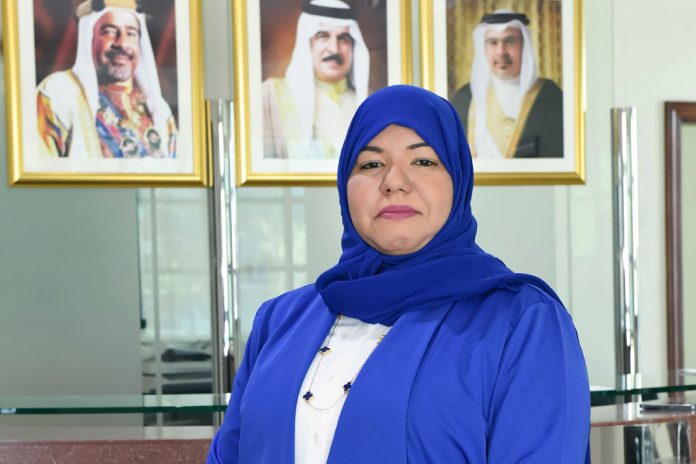When it comes to food safety, ensuring the integrity of imported food products is paramount to safeguarding public health. Within the Ministry of Health in Bahrain, Nujood Khalifa Almuqahwi stands at the forefront of this crucial endeavour as the Head of Imported Food Safety. In this exclusive interview with Woman This Month, she shares insights into her career journey, the Ministry’s overarching strategies for ensuring food safety, approaches to risk assessment, leveraging technology for monitoring and more
Ms. Almuqahwi’s career in the Ministry of Health began in 2007, starting as a health inspector and gradually progressing through various roles until she assumed her current position in 2014. Reflecting on her journey, she says: “My career path has been shaped by a blend of education, practical experience, advocacy and a genuine desire to contribute to the well-being of communities. My educational background includes a degree in Biology from the University of Bahrain, which laid the groundwork for my understanding of microbiology, biochemistry and epidemiology. I then achieved a Master’s in food safety and quality management from the UK, the specialised knowledge of which allowed me to delve into areas such as health policy, food science and food quality. To this day, a mixture of continuous learning and practical experience is vital to professional development.”
The Ministry of Health employs a range of strategies to ensure the safety of imported food products in Bahrain. Ms. Almuqahwi explains: “Given that approximately 90 percent of food in Bahrain is imported, these measures are crucial for maintaining high standards and minimising health risks.” These strategies include risk-based inspection services, public awareness campaigns, strengthening food safety management systems and fostering public-private partnerships.
All of these methods are in line with the ministry’s commitment to adhering to GCC and international standards to uphold food safety. Furthermore, the ministry’s collaboration with international food safety agencies and organisations such as the Codex Alimentarius Commission, WHO, INFOSAN and the GCC Standardisation Organisation allows it to harmonise standards, share information and enhance global food safety, she believes. By aligning with global best practices and standards, Bahrain ensures that its imported food products meet stringent safety requirements.
In discussing the Ministry’s approach to assessing and managing risks associated with imported food items, Ms. Almuqahwi emphasises the importance of rigorous testing and adherence to health policies. “We conduct physical tests and laboratory analyses to ensure that imported food products comply with safety standards,” she explains. “By prioritising risk-based approaches, the Ministry can identify and address potential hazards effectively.
“Technology plays a crucial role in enhancing the monitoring and safety standards of Bahrain’s imported food products. The ministry’s future plans include using the likes of big data, IoT, blockchain and predictive analytics in ensuring food safety. These advancements empower us to monitor imported food products more effectively, enhance safety, and build consumer trust. Ultimately, by leveraging technology, Bahrain can stay ahead of emerging food safety challenges and protect public health.”
Transparency in the supply chain is essential for maintaining consumer trust and ensuring the safety of imported food items. As such, the Ministry of Health enacts measures such as clear labelling, quality assurance practices and supply chain traceability to help enhance transparency. By collaborating with suppliers and third-party certifiers, Bahrain ensures accountability and reduces the risk of food fraud or adulteration.
Of course, food safety incidents do happen on occasion, but the Ministry has protocols in place to both minimise and combat them. According to Ms. Almuqahwi, multi-agency coordination, issuing alerts and recalls, and swift action to remove unsafe products from the market is the priority. “Our goal is to protect public health and minimise the impact of emergencies related to food safety,” she says. “By coordinating with other agencies and stakeholders, Bahrain can effectively address food safety incidents and prevent further harm to consumers.”
To reduce the likelihood of food safety issues with imported products, she recommends a comprehensive approach that includes improved response mechanisms, collaboration with international partners, education and training, traceability systems, consumer awareness and effective communication channels. “Prevention is key to ensuring the safety of imported food products,” she asserts. “By implementing preventive measures, Bahrain can proactively address potential risks and protect public health.”
In the face of emerging challenges in the global food market such as increased globalisation, climate change and food fraud, collaborative efforts and innovative solutions are required to tackle them. By strengthening international cooperation, adapting to environmental changes and enhancing consumer awareness, Bahrain can effectively address emerging food safety challenges and ensure the safety of imported food products.
Ms. Almuqahwi also encourages consumers to report food safety violations or concerns through hotline numbers, the Tawasul government website and the Tawasul SuperApp which serves as a communication app. “Consumer feedback is crucial for identifying potential risks and taking appropriate actions,” she says. “By actively engaging with consumers, Bahrain and the ministry can address food safety issues promptly and maintain public trust in its food safety regulations.”
Finally, Ms. Almuqahwi offers advice to young Bahrainis interested in pursuing careers in health or government. “Pursue higher education, engage in continuous learning and remain passionate about serving others,” she advises. “By fostering a culture of excellence and dedication, Bahrain can cultivate the next generation of leaders in the field of food safety and public health.
Remember that a career in health or government is not just a job; it’s a calling. Be passionate, committed and dedicated to serving others.”
By implementing preventive measures, Bahrain can proactively address potential risks and protect public health.”


































